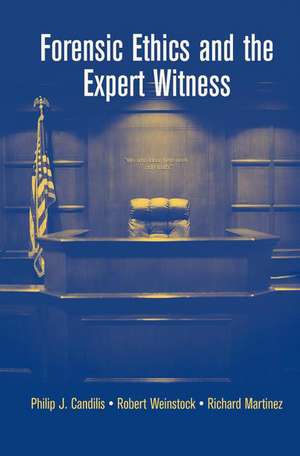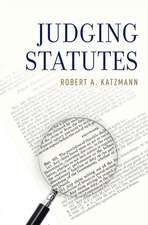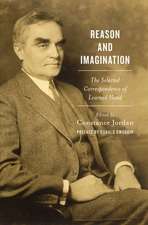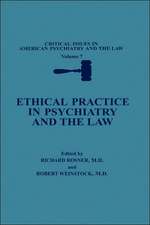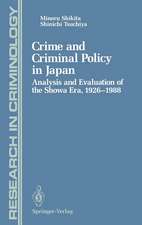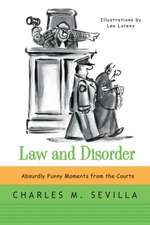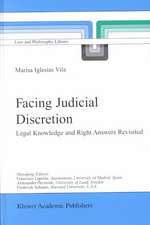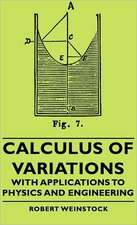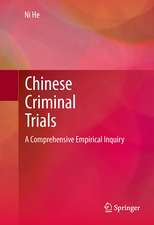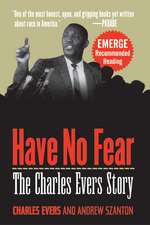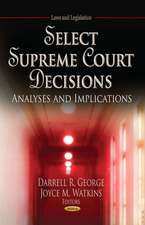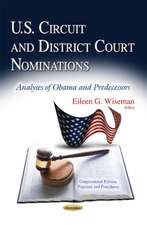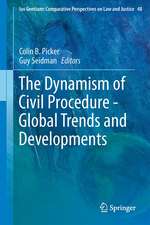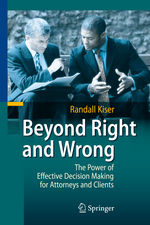Forensic Ethics and the Expert Witness
Autor Philip J. Candilis Editat de Andrew Szanton Autor Robert Weinstock, Richard Martinezen Limba Engleză Hardback – 31 ian 2007
| Toate formatele și edițiile | Preț | Express |
|---|---|---|
| Paperback (1) | 524.22 lei 43-57 zile | |
| Springer Us – 29 oct 2010 | 524.22 lei 43-57 zile | |
| Hardback (1) | 643.34 lei 43-57 zile | |
| Springer Us – 31 ian 2007 | 643.34 lei 43-57 zile |
Preț: 643.34 lei
Preț vechi: 756.86 lei
-15% Nou
Puncte Express: 965
Preț estimativ în valută:
123.10€ • 128.85$ • 102.46£
123.10€ • 128.85$ • 102.46£
Carte tipărită la comandă
Livrare economică 31 martie-14 aprilie
Preluare comenzi: 021 569.72.76
Specificații
ISBN-13: 9780387353807
ISBN-10: 0387353801
Pagini: 211
Ilustrații: XVI, 211 p.
Dimensiuni: 156 x 235 x 14 mm
Greutate: 0.5 kg
Ediția:2007
Editura: Springer Us
Colecția Springer
Locul publicării:New York, NY, United States
ISBN-10: 0387353801
Pagini: 211
Ilustrații: XVI, 211 p.
Dimensiuni: 156 x 235 x 14 mm
Greutate: 0.5 kg
Ediția:2007
Editura: Springer Us
Colecția Springer
Locul publicării:New York, NY, United States
Public țintă
Professional/practitionerCuprins
and Overview.- The Problem of the Expert’s Ethics in Court.- Cases and Examples Using the Approaches So Far.- Approaches That Guide Ethical Behavior.- Ethical Theories: Principled Models, Narrative Theory, and Professional Integrity.- Theories and Perspectives from Other Quarters.- Robust Professionalism: Beyond Role.- Applying Theory to Practice.- Ethical Reasoning for the Courtroom Expert.
Recenzii
"This was a rich, complex, and carefully written presentation of seminal and original thinking by three highly respected and experienced forensic psychiatrists....The take-away message from this thoughtful volume is that, in the authors' opinion, it is possible and perhaps highly desirable, in carefully selected situations, to wear two hats and combine the role of therapist with that of an expert witness....These well respected authors argue in a persuasive fashion and hopefully have sparked a worthwhile debate and a new look at the old maxim."
- Elissa P. Bendek, MD
American Journal of Psychiatry
"Forensic experts must struggle with the conflicting ethical demands of two roles, that of the clinician devoted to the care of patients, and that of the legal expert committed to the pursuit of justice. Whereas previous attempts to bridge this chasm have sought to separate these roles and avoid conflicts of interest, the authors of this volume have taken a radically different perspective. They have developed an integrated ethical approach based on a richly nuanced view of professional integrity. This book will surely shape the field of forensic ethics for years to come."
- Robert D. Truog, MD
Professor of Medical Ethics, Anaesthesia, and Pediatrics
Harvard Medical School
"Rich in concepts and provocative examples, this monograph on aspirational ethics takes us from history to practice to pitfalls an expert witness may encounter in this complex work. The authors, professional ethicists, skillfully orchestrate the viewpoints of different disciplines, using the techniques of the forum, the dialogue, and the argument to enrich their discussions of ethical dilemmas. As an added bonus, instruction on ethical principles and reasoning is woven through the material. This would be an excellent text for ethics courses as well as an aid to the practitioner."
-Thomas G. Gutheil, MD
Professor of Psychiatry, Harvard Medical School
Past president, American Academy of Psychiatry and the Law
"Candilis, Weinstock and Martinez make a major contribution to the discussion of bioethics and forensic psychiatry. The authors provide a comprehensive, clearly written history of bioethics and their own intriguing approach, "Robust Professionalism," to the analysis of ethical issues confronting forensic psychiatrists. They use the crucible of case examples to explore the strengths and weakness of a number of ethical systems and to demonstrate the components of sound ethical reasoning. A pleasure to read, this informative book is essential reading for forensic psychiatrists, scientific experts who provide courtroom testimony, attorneys and bioethicists."
-J. Richard Ciccone, MD
Professor of Psychiatry
University of Rochester School of Medicine
"Candilis and his colleagues have done a masterful job of setting out this history of forensic psychiatry ethics. Their scholarly explication of the subject also makes clear how complicated it is to work ethically in this subspecialty arena of medicine. This is a landmark text that makes a brilliant contribution to forensic ethics precisely because it is balanced, thoughtful, and persistently relevant to the work of forensic psychiatrists."
- Ezra E. H. Griffith, MD
Professor and Deputy Chair, Department of Psychiatry
Yale University School of Medicine
- Elissa P. Bendek, MD
American Journal of Psychiatry
"Forensic experts must struggle with the conflicting ethical demands of two roles, that of the clinician devoted to the care of patients, and that of the legal expert committed to the pursuit of justice. Whereas previous attempts to bridge this chasm have sought to separate these roles and avoid conflicts of interest, the authors of this volume have taken a radically different perspective. They have developed an integrated ethical approach based on a richly nuanced view of professional integrity. This book will surely shape the field of forensic ethics for years to come."
- Robert D. Truog, MD
Professor of Medical Ethics, Anaesthesia, and Pediatrics
Harvard Medical School
"Rich in concepts and provocative examples, this monograph on aspirational ethics takes us from history to practice to pitfalls an expert witness may encounter in this complex work. The authors, professional ethicists, skillfully orchestrate the viewpoints of different disciplines, using the techniques of the forum, the dialogue, and the argument to enrich their discussions of ethical dilemmas. As an added bonus, instruction on ethical principles and reasoning is woven through the material. This would be an excellent text for ethics courses as well as an aid to the practitioner."
-Thomas G. Gutheil, MD
Professor of Psychiatry, Harvard Medical School
Past president, American Academy of Psychiatry and the Law
"Candilis, Weinstock and Martinez make a major contribution to the discussion of bioethics and forensic psychiatry. The authors provide a comprehensive, clearly written history of bioethics and their own intriguing approach, "Robust Professionalism," to the analysis of ethical issues confronting forensic psychiatrists. They use the crucible of case examples to explore the strengths and weakness of a number of ethical systems and to demonstrate the components of sound ethical reasoning. A pleasure to read, this informative book is essential reading for forensic psychiatrists, scientific experts who provide courtroom testimony, attorneys and bioethicists."
-J. Richard Ciccone, MD
Professor of Psychiatry
University of Rochester School of Medicine
"Candilis and his colleagues have done a masterful job of setting out this history of forensic psychiatry ethics. Their scholarly explication of the subject also makes clear how complicated it is to work ethically in this subspecialty arena of medicine. This is a landmark text that makes a brilliant contribution to forensic ethics precisely because it is balanced, thoughtful, and persistently relevant to the work of forensic psychiatrists."
- Ezra E. H. Griffith, MD
Professor and Deputy Chair, Department of Psychiatry
Yale University School of Medicine
Notă biografică
Philip Candilis, MD, FAPA, completed his psychiatry residency and chief residency at Harvard Medical School’s Massachusetts General Hospital. He is formerly a Fellow in Medical Ethics at Harvard Medical School, and Fellow in Law and Psychiatry at the University of Massachusetts Medical School. Dr. Candilis has served as a hospital ethicist, hospital ethics committee chair, and ethics consultant to federal and state agencies. He chaired the effort to revise the ethics guidelines of the American Academy of Psychiatry and the Law (AAPL), served as writer, consultant, and editor for the professional ethics revision of the American Psychiatric Association (APA), and wrote for the revision of the APA’s research ethics guidelines. Dr. Candilis conducts federally funded research on informed consent at the University of Massachusetts Medical School, and serves as medical director of an inpatient unit in the Massachusetts Dept. of Mental Health. He lives in Arlington, MA, with his wife and daughter.
Robert Weinstock, MD completed his residency in general and adolescent psychiatry at McLean Hospital in Belmont, Massachusetts, and a research fellowship in psychiatry at Boston University Medical School. He is certified in forensic psychiatry by the ABPN. Dr. Weinstock is former chair of the ethics committee of AAPL, and of the good forensic practice committee of the American Academy of Forensic Sciences. While chair of AAPL’s ethics committee the guidelines were revised twice and the only Opinions of the AAPL Ethics Committee promulgated. Dr. Weinstock co-edited Ethical Practice in Psychiatry and Law published by Kluwer in 1990, and has written numerous papers on forensic ethics. He chairs the California Psychiatric Association’s Judicial Action Committee and has served on the APA judicial action committee and is a distinguished fellow of the APA. Dr. Weinstock is clinical professor of psychiatry at UCLA where he is director of theforensic psychiatry fellowship program.
Richard Martinez, MD, completed undergraduate studies at Tulane University and a Master of Humanities degree at the University of Colorado. He received his M.D. from LSU Medical School in New Orleans and completed a Fellowship in the Division of Medical Ethics at Harvard Medical School, followed by a Fellowship at the Center for Ethics and the Professions at Harvard University from 1994-96. As an Associate Professor in the Center for Bioethics and Humanities, he coordinated the clinical ethics and graduate medical education initiatives in ethics and professionalism for several years.
He has written on topics of professional ethics and social responsibility, organizational healthcare ethics, medical undergraduate education, boundaries in the patient-professional relationship, and the medical humanities. Currently, Dr. Martinez is the Director of Psychiatric Emergency and Forensic Services at Denver Health Medical Center and Denver County Jail and is an Associate Professor of Psychiatry at the University of Colorado Health Sciences Center and Interim Training Director of the Fellowship in Forensic Psychiatry. He is certified by the American Board of Psychiatry and Neurology in the sub-specialty of Forensic Psychiatry and is a Distinguished Fellow of the American Psychiatric Association.
Robert Weinstock, MD completed his residency in general and adolescent psychiatry at McLean Hospital in Belmont, Massachusetts, and a research fellowship in psychiatry at Boston University Medical School. He is certified in forensic psychiatry by the ABPN. Dr. Weinstock is former chair of the ethics committee of AAPL, and of the good forensic practice committee of the American Academy of Forensic Sciences. While chair of AAPL’s ethics committee the guidelines were revised twice and the only Opinions of the AAPL Ethics Committee promulgated. Dr. Weinstock co-edited Ethical Practice in Psychiatry and Law published by Kluwer in 1990, and has written numerous papers on forensic ethics. He chairs the California Psychiatric Association’s Judicial Action Committee and has served on the APA judicial action committee and is a distinguished fellow of the APA. Dr. Weinstock is clinical professor of psychiatry at UCLA where he is director of theforensic psychiatry fellowship program.
Richard Martinez, MD, completed undergraduate studies at Tulane University and a Master of Humanities degree at the University of Colorado. He received his M.D. from LSU Medical School in New Orleans and completed a Fellowship in the Division of Medical Ethics at Harvard Medical School, followed by a Fellowship at the Center for Ethics and the Professions at Harvard University from 1994-96. As an Associate Professor in the Center for Bioethics and Humanities, he coordinated the clinical ethics and graduate medical education initiatives in ethics and professionalism for several years.
He has written on topics of professional ethics and social responsibility, organizational healthcare ethics, medical undergraduate education, boundaries in the patient-professional relationship, and the medical humanities. Currently, Dr. Martinez is the Director of Psychiatric Emergency and Forensic Services at Denver Health Medical Center and Denver County Jail and is an Associate Professor of Psychiatry at the University of Colorado Health Sciences Center and Interim Training Director of the Fellowship in Forensic Psychiatry. He is certified by the American Board of Psychiatry and Neurology in the sub-specialty of Forensic Psychiatry and is a Distinguished Fellow of the American Psychiatric Association.
Textul de pe ultima copertă
The expert witness’ job is often described as a balancing act: duty to clients on the one hand, duty to society on the other. Forensic Ethics and the Expert Witness probes beyond this familiar conflict of interest framework to present a new, innovative model of professional ethics.
Richly illustrated with cases from medicine, psychiatry, and law, this elegantly written volume examines the common moral ground that links these usually separate domains, and relates forensic ethics to larger concepts of morality and justice. In this integrative approach, the expert witness is redefined as one who can balance professional with societal and personal codes in what the authors call "robust professionalism."
Three renowned ethicists:
Richly illustrated with cases from medicine, psychiatry, and law, this elegantly written volume examines the common moral ground that links these usually separate domains, and relates forensic ethics to larger concepts of morality and justice. In this integrative approach, the expert witness is redefined as one who can balance professional with societal and personal codes in what the authors call "robust professionalism."
Three renowned ethicists:
- Analyze ethical dilemmas expert witnesses commonly encounter in the courtroom
- Explore the thought and practice of ethical expert witnesses
- Address important questions concerning confidentiality, objectivity in testimony, and the relationship between witness and attorney
- Integrate trends in moral reasoning from other fields, from classical philosophy to social contract theory to bioethics
- Review standards of conduct from relevant professional organizations
- Apply this discussion to the most debated areas, including competence, the insanity defense, right-to-die, and death penalty cases
Caracteristici
Details possible ethical situations and pitfalls that forensic psychiatric experts would commonly encounter when making a court testimony Supports the foundations of medical ethics that balance duties to the subject with duties to society Includes supplementary material: sn.pub/extras
